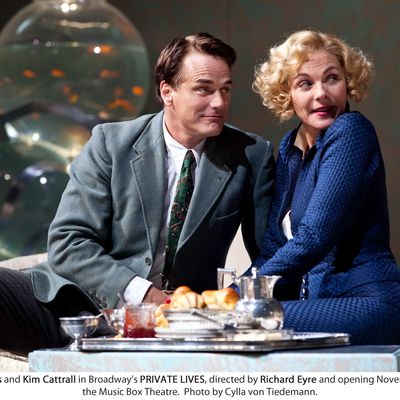
“For me,” a famous director once told the New York Times, “Coward is nails down a blackboard.” That was Sir Richard Eyre, ten years ago. Today, he’s directing the first Noel Coward play of his long and distinguished career, the nth Broadway revival of Private Lives, starring Sex and the City’s Kim Cattrall and the dapper Canadian leading man Paul Gross (Slings & Arrows, Due South). The results are perfectly competent, often charming, and a little flat. Maybe not Norfolk-flat, but not exactly well-hillocked, either: The stomach-tickling rise and fall of comedy is here reduced to a gentle rocking motion. Laughter: Present! But not exactly preeminent. Clearly, Eyre still doesn’t relish Coward, and Coward seems to feel the same way about Eyre: The play recoils a little at his touch, and the coolness has, to some extent, spread to the leads, both of whom are technically excellent, but who exhibit a bit more chemistry with themselves than each other. The laughs land gingerly, and some merely touch down and flutter off again.
Private Lives is widely regarded as Coward’s masterpiece, his finest fusion of high camp, quiet sentimentality, and melancholy iconoclasm. The aging sybarite Elyot Chase (Gross) has just remarried, and is honeymooning in Deauville with his much-younger bride, Sibyl (a sweetly befuddled Anna Madeley, whose big-eyed, blonde-bombshell entrance set off star-recognition applause intended for Cattrall on the night I attended). Randomly, his equally self-involved ex-wife Amanda (Cattrall) is honeymooning with her priggish second husband, Victor (Simon Paisley Day), in the suite next door; the two couples’ rooms share a balcony. Like volatile chemicals, Amanda and Elyot are destined to recombine (Act One) and explode (Acts Two and Three), defying their divorce before remembering why they had one: Quite literally, they nearly killed each other. (“Some women should be struck regularly, like gongs,” Elyot famously decrees, reminding still-amused modern audiences that Private Lives, like The Honeymooners, is one of those museums of domestic-violence comedy that we can continue to feel comfortable visiting.)
Gross is the evening’s highlight, with his flawless lacquer of disdain broken only by eruptions of mania. (His third-act face-off with Day’s fusty, fuming Victor is particularly zippy and unpredictable.) He’s in close touch with the anarchist, the sociopath, and the romantic struggling to burst from Elyot’s crisp English outer chrysalid. Cattrall is all poise and perfect timing as Amanda, Elyot’s double and opposite-number. But engage this pair in a carnal slapstick pas de deux — the play’s boisterous second act, basically an extended sexual sumo match — and you can see them counting the steps a bit. There seems to be a cushion between them at all times. Eyre treats them delicately, like breakables, placing them on Rob Howell’s cavernously serene Deco aquarium of a set with such care and deliberation that everything they do up there — amorous, violent, or in between — can’t help but feel intensely choreographed. (And, for my money, not nearly enough of that lovely stage environment gets broken. This is amour fou! Smash some shit!) And where the carnality falters, so does the comedy: Eyre doesn’t seem to enjoy “the bit,” that irreducible unit of comic orchestration. Some business with a serving tray and a moving coffee table (to give one example) will begin to take shape … and then taper off into nothing. Private Lives, for all its abundant wit, doesn’t unfold in a strictly verbal realm, and its pedestal shouldn’t elevate it too far above Stoogery. It’s extraordinary how potent cheap comedy is, and I can’t help but feel that if Eyre had made it even cheaper — and wrestled his leads down into the sultry muck a little more — he might’ve attracted more buyers.
Private Lives is at the Music Box Theatre.

